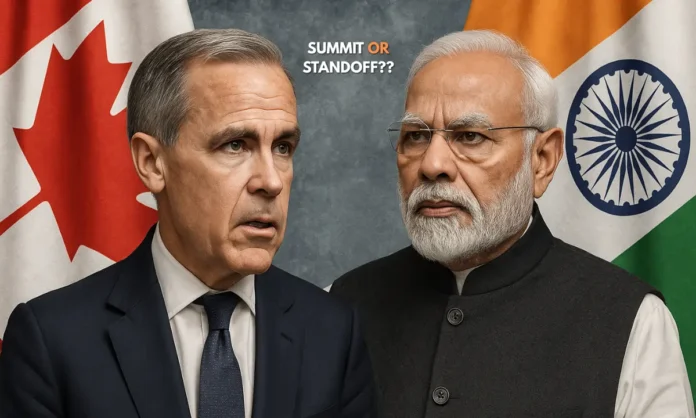Summary
- Canadian PM Mark Carney has invited Indian PM Narendra Modi to the G7 Summit in Alberta despite a diplomatic freeze and ongoing investigations into the assassination of Sikh activist Hardeep Singh Nijjar.
- The World Sikh Organization and human rights groups denounced the invitation as a betrayal of Canadian values, citing India’s alleged role in transnational repression.
- Carney defended his move citing India’s economic and geopolitical centrality, aiming to focus on AI, energy, and critical minerals cooperation at the summit.
Strategic Calculations Behind the G7 Olive Branch
When Canadian Prime Minister Mark Carney announced his invitation to Indian PM Narendra Modi for the G7 Summit scheduled from June 15–17 in Alberta, it was not merely a diplomatic gesture. It was a high-stakes gamble on global realignment. Coming less than a year after the Royal Canadian Mounted Police (RCMP) accused the Indian government of orchestrating the murder of Sikh separatist Hardeep Singh Nijjar in Surrey, British Columbia, the move sent shockwaves through Canada’s civil society and diplomatic circles.
Carney, who took office in March 2025, framed his outreach in pragmatic terms: India is the world’s fifth-largest economy, the most populous country, and central to global supply chains. The summit’s themes—critical minerals, artificial intelligence, and energy—require India’s presence at the table. However, beneath this veneer of realpolitik lies a tension: can democratic alliances look past human rights concerns for strategic cooperation?
The Indian government, for its part, welcomed the invitation. Modi emphasized “mutual respect and shared interests,” signaling his readiness to shift gears in a bilateral relationship that had stalled after last year’s reciprocal diplomatic expulsions. Yet, that welcome comes even as India refuses to cooperate with Canada’s ongoing criminal investigation—a fact that sits uneasily with many Canadians.
Anyway they spin this, it is glaringly evident that Modi and his toli have lost respect with this exclusion from the #G7Summit
— Be the Change👊🏻 aka Jennifer Fernandes (@nandtara) June 7, 2025
Yet another dent in our global stature courtesy the self ordained #Vishwaguru
So @CanadianPM has lost his nerve and flipped with an nth hour invite,… pic.twitter.com/DJwgsSWKQU
Sikh Community’s Recoil and Accusations of Betrayal
- World Sikh Organization calls invitation a “shameful” endorsement of state-led assassination.
- Civil society groups highlight double standards in Canada’s foreign policy on human rights.
- Carney’s government faces domestic pressure to clarify how justice aligns with diplomacy.
For the World Sikh Organization (WSO) and diaspora rights advocates, the Modi invitation represents not just a tactical misstep but a moral failure. WSO President Danish Singh’s statement was searing: “This is a betrayal, not just of our community, but of core Canadian values.” He invoked the standard by which Canada has treated countries like Russia, Iran, and China, asking why India—despite allegations of orchestrating a political murder on Canadian soil—is treated differently.
The RCMP’s case against four Indian nationals, now charged with Nijjar’s killing, has further intensified scrutiny. Civil society leaders argue that Canada is brushing serious accusations under the rug in the name of economic expediency. “We’re being told that trade, AI, and energy matter more than justice,” one WSO affiliate told UnreadWhy.
This dissent is not isolated. Sikh voters form a powerful bloc in parts of British Columbia and Ontario. Carney’s Liberal Party risks alienating them just months into his tenure. As the G7 Summit nears, calls for public protests are already gaining momentum on social media, with hashtags like #JusticeForNijjar and #NoWelcomeForModi trending across platforms.
Realpolitik, Recalibration, and the New Global Order
- Carney also engages China and Trump to reset foreign relations amid trade war fatigue.
- India’s inclusion reflects its rising leverage over global economic, security, and supply chain systems.
- Critics warn of long-term erosion of democratic accountability in foreign policy.
Carney’s G7 diplomacy is part of a broader recalibration of Canada’s external engagements. In the same week as the Modi invite, he held a high-level call with Chinese Premier Li Qiang to ease a trade dispute affecting billions in seafood, canola, and pork exports. Simultaneously, he is in “deep discussions” with Donald Trump to end damaging tariffs on Canadian steel and aluminum.
In this strategic chessboard, India isn’t a wild card—it’s a kingpin. From rare earths to vaccine manufacturing to semiconductor ambitions, India commands global attention. But critics argue that Carney’s decision sets a dangerous precedent: by extending red carpet diplomacy to a nation under credible allegations of extrajudicial killings abroad, Canada risks becoming complicit in the erosion of democratic norms.
India, for its part, has consistently denied any role in Nijjar’s killing, calling the allegations “absurd” and “politically motivated.” However, its refusal to cooperate with Canadian investigators casts a long shadow over its credibility—especially among liberal democracies that claim to uphold the rule of law.
Beyond the Red Carpet: What the G7 Moment Really Signals
The invitation to Modi is more than a bilateral gesture—it’s a litmus test for the values the G7 claims to protect. Mark Carney’s defense—that engagement is necessary for progress—makes sense in a world increasingly shaped by polycrisis. But it also risks validating impunity. As the G7 summit unfolds in Alberta, the world will watch not only what agreements are signed but what silences are allowed to pass.
For Canada, this moment may define the contours of its foreign policy under Carney: pragmatism over principle, partnerships over justice. For India, it may signal international acceptance in spite of unresolved controversies. And for the Sikh community, it raises the question—what weight does their justice hold in the geopolitics of the G7?


